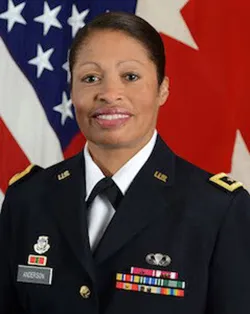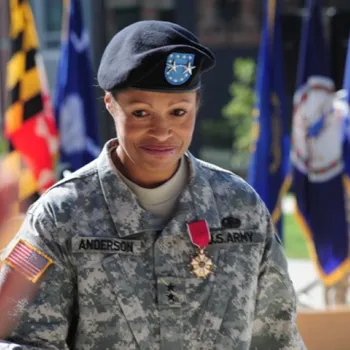Marcia M. Anderson has a rare perspective on military and civilian service. In 2011, she became the U.S. Army’s first African American female major general, a position she held until her retirement in 2016. For 30 years, she also has served as a federal court administrator, currently as clerk of court for the U.S. Bankruptcy Court for the Western District of Wisconsin.
Anderson, whose career was the focus of a 2012 video produced by the Administrative Office of the U.S. Courts, offered her reflections on public service in commemoration of Veterans Day 2019.

Marcia Anderson
Q. When and why did you join the military?
It was actually very unintentional. In 1977, I was registering for classes, and Creighton University required all liberal arts majors to take a science class. Unfortunately, the only one I wanted to take was astronomy, but since I had a night job, that was out of the question. So, as I was standing in the gym searching for a class (this was obviously pre-internet!), I saw one table that had nobody in line. The sign identified it as the Military Science Department and in smaller print it said Reserve Officer Training Corps (Army ROTC).
I wandered over, and after the “nice man” (who was probably a used car salesman on the weekends) explained it was four credits, met in the morning, and even had something called a stipend just for going to class, I enthusiastically signed up. They also had really cool pictures of people rappelling and “hiking,” so I thought it was like a physical education class. The rest, of course, is history. I will say that I really liked the military history aspect, and the leadership classes and group discussions were an added bonus. I never looked back and have never regretted my decision.
Q. Thinking back to the young woman who became a commissioned officer, how did your years in the Army change you?
I was always painfully shy. And, even if I knew the answer, it took skillful teachers to pull it out of me and make me speak in class. The Army (and, I think rest of the military) is very good at two things in terms of developing leaders: 1) You are offered multiple opportunities to lead throughout your career, whether it is 10 people or a thousand; and 2) there is an emphasis on capitalizing on teachable moments, as well as mandatory professional military education at specific times throughout your career.
So, the Army did not give me a choice – from the beginning in ROTC, I rotated through leadership jobs. This made me learn how to motivate others, and when I needed to assert myself to get things done. I could not be shy or hesitate. Too many people were depending on me and I did not want to let them down.
Q. You also have spent a career in the federal Judiciary. Did your Army service influence how you approached your court service, and vice versa?
Yes, both careers absolutely complemented each other! I once did a presentation for a Federal Judicial Center leadership program that I think I called: “A Clerk in the Pentagon – Oh My!” I compared and contrasted managing programs and relationships in my role as a senior Army leader in the Department of Defense with my role as a clerk of court in the Judiciary.
The two primary skills that I believe made me successful in both places were building strong relationships based on trust (once you lose trust, you are done); and my determination to take strategic steps based on what was good for the organization, and not my narrow interests. I was also acutely aware (and often reminded people at the Pentagon) that too many people fall prey to group-think and agree to support a decision or policy even if they know it is bad. In the military, real people pay the price for bad decisions and poor policy. The same is true in the Judiciary – we must be “courageous followers” who speak the truth even when it is difficult or unpopular.
Q. Are there any important lessons that Americans can reflect on this Nov. 11? This can include Americans who have never served in the military.
The Army constantly talks to new privates and lieutenants about the importance of living your values. There are seven Army values: loyalty, duty, respect, selfless service, honor, integrity, and personal courage. They form the acronym LDRSHIP and are the basis for a culture of teamwork, as well as excellence, and describe the ethical standards expected of all soldiers. Obviously, not everyone meets those standards, but the point is striving to achieve them. Otherwise, we risk becoming like many of the militaries and countries that do not value or cultivate these things in people.
Q. What do you personally think about on Veterans Day? And how will you observe Veterans Day this year?
I have often been asked to speak to various groups, and a theme that I keep returning to centers on these facts: Ninety-nine percent of Americans are not veterans, and 75 percent of our youth do not currently qualify to serve due to physical or educational deficiencies, which means that those who do are special.
By the same token, even if we do not agree with the idea of serving, we still have a duty to care for those who have made that sacrifice, as well as their families. There are over 18 million veterans living in our country! I hope everyone will do more than just thank a veteran for their service. Many of them are living with lifelong disabilities as a result of their service or are homeless or underemployed. Supporting those programs and organizations that help veterans who are struggling is more important than ever. I personally see it as a day of service and try to find a way to volunteer and help.
Q. Do you have any other thoughts?
There is a quote I would like to end with that I have always liked, by Mahatma Gandhi, that I think sums up my belief in public service: “The best way to find yourself is to lose yourself in the service of others.” Thanks for letting me share!
Subscribe to News Updates
Subscribe to be notified when the news section is updated.


